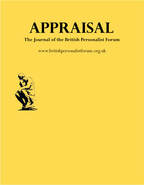|
|
Appraisal Volume 12, No.s 1 and 2, Spring and Autumn 2020ISSN 2514-5584
EditorialR. T. Allen
Welcome to the first and second regular issues of Vol. 12, 2020-2021 of Appraisal which is now wholly 'open access'. It seems, and is, a long time since Vol. 1, No. 1, 1996. Then, and until 2009, I produced Appraisal and organised annual conferences all by myself, until I was able to shed most of my responsibilities to other members of what eventually became the British Personalist Forum. But now I find myself editing it again! I shall insist that after the next issue I shall give it up for good.
We owe a vote of thanks to David Jewson who, having taken the Treasurership from me, has added that Webmaster in time for the end of the printed version of Appraisal, and its transformation into a wholly online and completely Open Access journal, which charges no fees for accepted articles to be published nor subscriptions for reading it. Because we have no university or other institutional support, we depend wholly upon members subscriptions, for which we shall offer certain privileges, in order to finance Appraisal, conferences and other ventures, with the aim of spreading interest in personalist thinking. So, if you enjoy and learn from our articles in this joint issue, and intend to read further issues, then please consider becoming a member and paying the appropriate annual subscription. What do we offer in the present combined issue? First a rich dish of six full articles: one by Soren Engelson on attitude-dependent accounts of value, and Edward Hackett on 'The Becoming of the Personal Sphere: A Proposed Framework for Personalist Philosophical Anthropology', both inspired by Max Scheler, the great German personalist philosopher; Abigail Klassen defending 'folk psychology' against the Churchlands' eliminative materialism, but with a twist at the end; Jane Kisbey on the moral responsibility of psychopaths; Daniel Paksi's final instalment of his 'Medium Emergence'; and Alan Ford on despair and integrity in Kierkegaard, Dostoyevsky and others. Next comes my own short Discussion piece, urging caution about the 'the common good' lest it excludes much needed uncommon ones, and finally reviews of three important books. All these have clear relevance for personalist thinking. Yet I find that, while personalists of all streams and schools oppose scientistic reductionism, only Michael Polanyi, using his own experience as an internationally recognised Professor of Physical Chemistry at the Max Planck Institute and then at the University of Manchester, has shown its hollowness on its own grounds, the natural and especially the physical sciences. But outside the societies dedicated to him in the USA, Hungary and our own Forum, he is barely mentioned, while Karl Popper is still taken to be an authority although he never went near a laboratory, nor saw what scientists actually do, and never knew how full personal engagement is required of them in their work. Six thousand years separates the two objects pictured on the front page, both used separately in previous issues: the anonymous blue-clay figurine (about 3-4 inches high if I correctly remember from 1975) from the Neolithic Hamangia Culture, now in the Romanian National Historical Museum in Romania, with female sitting companion, from Rodin's sculpture of the same subject in different sizes in Paris. We can know quite a lot about Rodin and we can make plausible guesses as to what 'Le Penseur' might have thinking, but we can hardly guess what 'Grânditorul' (literally 'Thinkerthe') is thinking, in what language, and with what range of words. Indeed, can he think without speaking? Is he simply resting and experiencing inchoate emotions which he does not clarify by articulating them? We shall never know. But there is no doubt that he is one of us, a person whom we can recognise across the ages. R. T. Allen |
Proudly powered by Weebly

